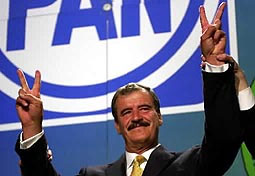 |
 |
 |
 Editorials | At Issue | April 2005 Editorials | At Issue | April 2005  
The Decline Of The Pan
 Fred Rosen - The Herald Mexico Fred Rosen - The Herald Mexico


| Vicente Fox makes the sign of victory at the PAN's headquarters in Mexico City after his election in 2000. (Photo: AP)

|
Even more remarkable than the rise in popularity of Andrés Manuel López Obrador over these past few weeks has been the decline in legitimacy of the National Action Party (PAN), the party that has sought most actively to prevent him from competing for the presidency. Doubt is widespread even among self-declared panistas.

According to a Mitofsky poll taken just after the desafuero vote in the Chamber of Deputies, 57 percent of respondents who identify themselves as partisans of the PAN think AMLO, as López Obrador is known, should not be barred from participating in next year's presidential campaign. Among the general population, of course, the percentage is higher, some 65 percent.

And according to a recent Parametría poll, panistas themselves are evenly divided as to the “justice” of the desafuero. When asked whether the process was “just” or “unjust,” 35 percent came down on either side of the issue, the rest being undecided. This is remarkable because the PAN has not only spent the past year demonizing López Obrador, but defining its own identity as a party opposed to a chief of government (ie AMLO) placing himself above the law. Obviously, it has not made a credible case against López Obrador, even to its own party faithful.

This is ominous news for Vicente Fox's party of “change.” It had come to power promising to transform Mexican politics from a back-room, deal-making affair into a democratic, transparent, participatory project. The conservative panista rank and file will very likely vote against López Obrador should he become the PRD candidate for the presidency next year, but are apparently leery of the closed-door process that may remove him from the campaign. AMLO's road-building activity is increasingly perceived by the Mexican public to be a pretext to keep him from the presidency.

It is too early to say how the short-term process will turn out: whether López Obrador will return to the helm of Mexico City's government, whether he will spend time in prison, whether he will allow himself to be bailed out by his enemies, whether he will be allowed to run for president, and if not, whether he will campaign anyway.

But paradoxically, the long-term can be foreseen more clearly than the short term: the PAN, while still the country's major conservative party-especially when it comes to “cultural” and religious issues-will lose its legitimizing presence as the party of open and honest government. Unless that is reversed, the party faithful will continue to lose faith, independent supporters (bearers of the “useful vote”) will drift to other parties and the party will no longer be a serious contender for political power.

That the party is quite aware of this state of affairs-and doesn't know what to do about it-has been made quite clear by the circus-like atmosphere of the past week. Last Monday, Interior Secretary Santiago Creel, defender of the party line that the desafuero had nothing to do with politics, and was a purely judicial affair, remarked that a political settlement with AMLO was not out of the question, that a political solution was possible. This was the first time any high-ranking PAN official, let alone the point man in the party's desafuero drive, acknowledged there was a problem to which a “solution” might be necessary. It was the first time the word “political” had crept into the PAN's desafuero lexicon.

On Tuesday, presidential spokesman Rubén Aguilar had to interpret Creel's apparent heresy. A political solution was possible, he explained, presumably speaking for the president, but only within “the realm of legality.” Manuel Espino, president of the party's National Executive Committee, parsed the PAN position even more finely, saying “a political solution, but not a negotiation, is a good solution, a good solution.”

Then on Wednesday, two Mexico City PAN deputies, fierce AMLO opponents who have interrupted his press conferences with oppositional outbursts, prepaid his bail, “in good faith” and to improve party relations in the nation's capital. Could the Marx Brothers have written a better script?

So PAN officials are looking for “good faith” and “good solutions.” Having created the awkward situation in which they now find themselves, they are looking for a way out. After months of hard-line attack, they are retreating into defense mode.

Having packaged themselves as new democrats in order to attract support from the entire political spectrum in 2000, but having adopted a style of politics that brooks no compromise, they have painted themselves into a difficult corner. And there may be no way out. | 
 | |
 |



